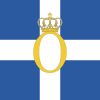This article has multiple issues. Please help improve it or discuss these issues on the talk page. (Learn how and when to remove these messages)
|
| Theoklitos Farmakidis | |
|---|---|
 Theoklitos Farmakidis Theoklitos FarmakidisPortrait by Dionysios Tsokos | |
| Born | (1784-01-15)15 January 1784 Nibegler, Ottoman Empire |
| Died | 26 April 1860(1860-04-26) (aged 76) Athens, Kingdom of Greece |
| Era | Age of Enlightenment |
| Region | Western philosophy |
| School | Liberalism, Modern Greek Enlightenment |
| Main interests | Freedom of religion, Greek Independence |
Theoklitos Farmakidis (born Theoharis Farmakidis; Greek: Θεόκλητος (Θεοχάρης) Φαρμακίδης; 1784–1860) was a Greek scholar and journalist. He was a notable figure of the Modern Greek Enlightenment.
Biography
He was born in 1784 in Nibegler (Νιμπεγλέρ) near Larissa, in the Thessaly region of northern Greece. He studied at the Phanar Greek Orthodox College and the Princely Academy of Iași. After Anthimos Gazis he continued the publishing of Hermes o Logios with his partner Konstantinos Kokkinakis. He joined the Philiki Etaireia and became an admirer of Adamantios Korais, supporter of Greek independence and critic of the Ecumenical Patriarchate of Constantinople.
Greek Revolution
After the outbreak of the Greek War of Independence, he approached Dimitrios Ypsilantis. In August 1821, in Kalamata he started publishing the Greek newspaper Elliniki Salpinx ("Greek Bugle"). He took part at the National Assemblies of Epidaurus and Astros and later he taught in the Ionian Academy (1823-1825).
Thought
He was a supporter of the English party and Alexandros Mavrokordatos. During the reign of Otto, he was advisor on ecclesiastical/religious matters and supporter of the establishment of the Church of Greece. He was liberal and tolerant to the different dogmas and became friend with Jonas King, the controversial Protestant missionary in Greece.
A strongly pro-West supporter, he was against the Greek involvement in the Crimean War.
Selected works
- Elements of the Greek language, Athens, 1815
- Apology, Athens, 1840
- The Synodal Tome or About the Truth, Athens, 1852
Sources
- Βγένα Α. Βαρθολομαίου, Η δίκη του Θεόκλητου Φαρμακίδη (1829-1839), Μνήμων 4 (1974), σελ. 172–214.
| Greece during the reign of Otto (1832–1862) | ||
|---|---|---|
| Capital |  | |
| Monarchs | ||
| Regency Council | ||
| Prime Ministers |
| |
| Architects | ||
| Notable People | ||
| Early Greek Parties | ||
| Events | ||
| Influence |
| |
| Structures | ||
| Institutions |
| |
| Other | ||
- History of Greece (1832–1862)
- 1784 births
- 1860 deaths
- 19th-century Greek philosophers
- Greek theologians
- Greek scholars
- Greek people of the Greek War of Independence
- People of the Modern Greek Enlightenment
- Members of the Filiki Eteria
- Greek Eastern Orthodox priests
- 19th-century Eastern Orthodox priests
- Enlightenment philosophers
- Age of Enlightenment
- People from Larissa (regional unit)
